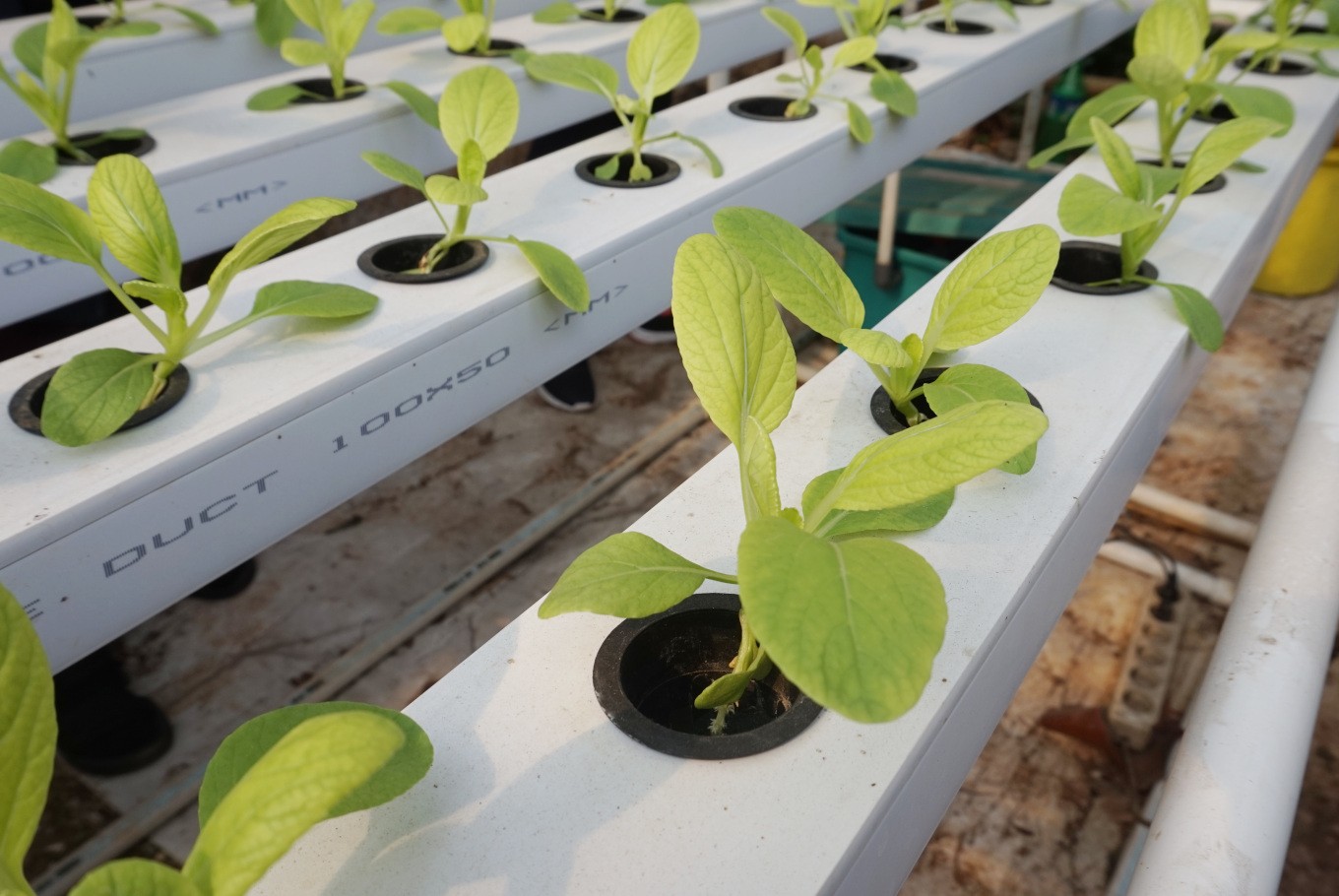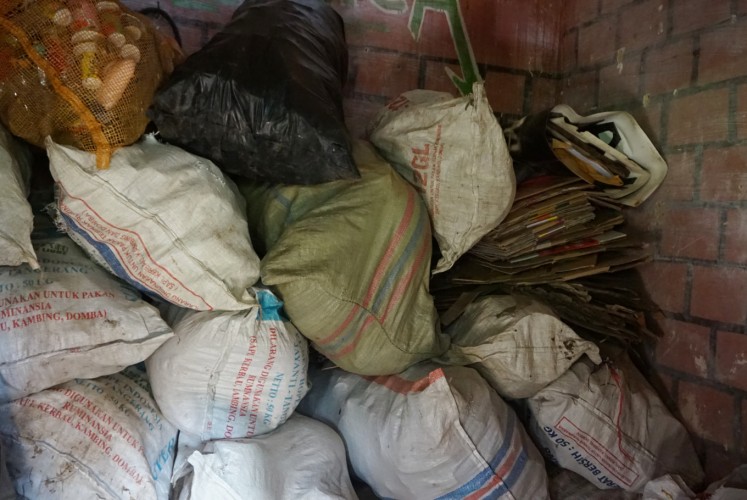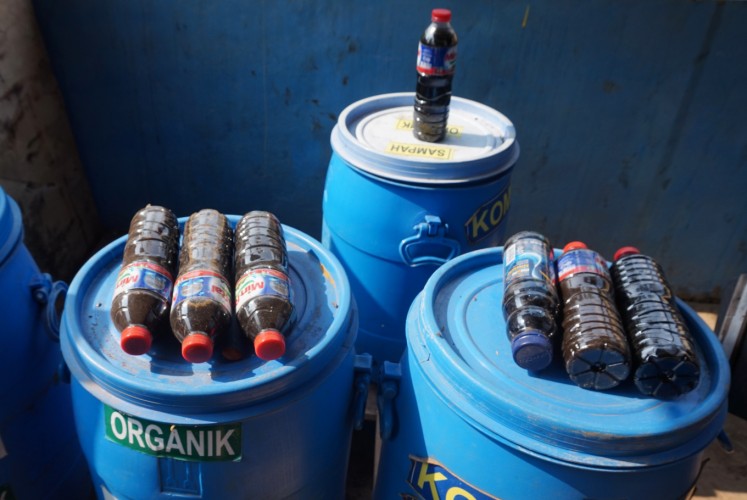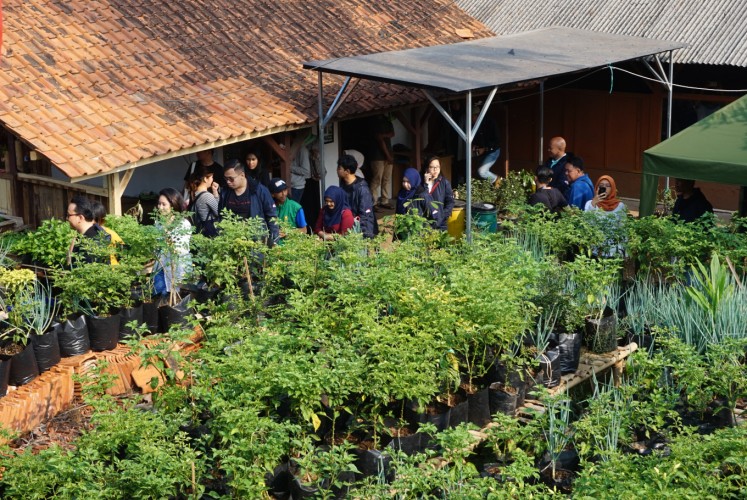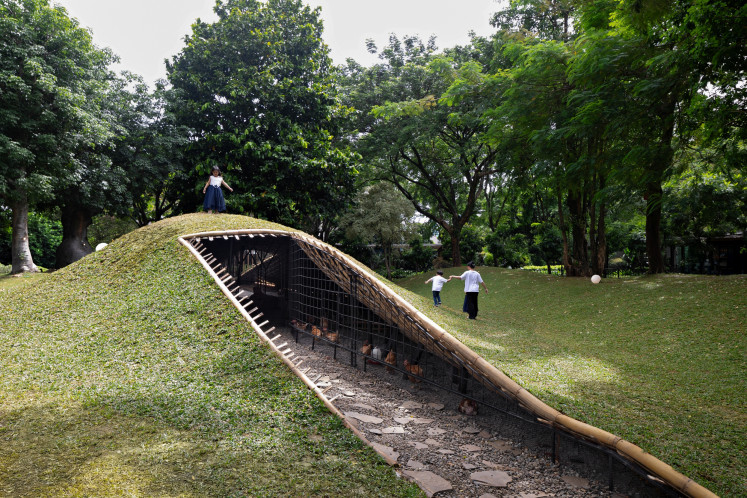Popular Reads
Top Results
Can't find what you're looking for?
View all search resultsPopular Reads
Top Results
Can't find what you're looking for?
View all search resultsPadalarang village in pursuit of conservation, sustainable living
A conservation-based village, the Kampung Berseri Astra Cidadap, wants to instill an ecofriendly mindset in the villagers and develop their potential.
Change text size
Gift Premium Articles
to Anyone
A waste bank is one of the ways to practice ecofriendly trash management in a neighborhood.
The bank becomes the point where household waste is gathered by the residents to be recycled or later sold. People who collect their trash usually receive cash in return.
Such a system has been implemented in Kampung Berseri Astra Cidadap in Padalarang, West Java.
In that village, plastic still dominates the waste dropped off by the residents, although they also gather cardboard boxes and scrap metal. The majority of the trash gathered is recycled into ecofriendly bricks (ecobricks), a process that usually takes about two weeks.
On average, the waste bank team usually gathers 25 kilograms of trash each month. They pay the residents based on the type of trash, but generally the prices start at Rp 3,000 (22 cents).
The waste bank is just one of several ecofriendly activities practiced by the locals at Kampung Berseri Astra Cidadap, which is centered on an area named Taman Edukasi Terpadu (Integrated Educational Park). The conservation-based village also implements a hydroponic farming system, grows chili seedlings, produces biogas and creates compost from household waste.
The locals also run a coffee shop in Padalarang named Origin Coffee, where they offer beverages made of Arabica coffee trees that they grow and harvest themselves.
Not only that, the villagers also manage a tourist destination dubbed Hawu Cliff, which currently serves as a popular attraction for climbing enthusiasts in Padalarang.
All the benefits from the aforementioned activities are said to be enjoyed by the locals themselves. The chili seedling harvests, for instance, are given to the residents to encourage them to grow the seedlings in their own houses.
According to Deden Syarif Hidayat, head of the Kampung Berseri Astra Cidadap and the Citatah Karst Lover Youth Forum (FP2KC), the village aims to encourage its residents to possess ecofriendly mindsets and develop their potential. “It also aims to be an example for other villages,” he recently told The Jakarta Post.
Read also: Waste bank books income of Rp 200 million in 6 months
Established in 2017, Kampung Berseri Astra Cidadap is part of sustainable social contribution program initiated by PT Astra International. The group provides facilities and education to the locals in different aspects, one of which is environmental.
Boy Kelana Soebroto, head of corporate communications at PT Astra International, said up to 86 of such villages can currently be found across Indonesia, including on Sumatra and in Kalimantan.
“Prior to collaborating with a village, we usually conduct social mapping to estimate whether the locals want to grow with us or not because we cannot force [them],” Boy said on Nov. 22 in West Java. “We also pay attention to each village’s local wisdom and preserve it.”
The program may accelerate any movements that have been done by the locals or start one from zero together with them.
“Our [main] concept is supporting the locals. The challenges are varied, but the locals have to have the willingness to move forward," Boy added.
The natural process of making compost from household waste. (JP/Ni Nyoman Wira)Kampung Berseri Astra Cidadap is part of the Karst Citatah area, which stretches up to 6 kilometers from Tagogapu village to South Rajamandala village. Said to be formed from 20 million to 30 million years ago, Karst Citatah area is home to the Stone Garden Geopark and the Pawon Cave – prehistoric human fossils have been excavated from the latter.
Unfortunately, the area also hosts sporadic chalk mining, which has caused significant environmental damage, such as pollution, erosion and changes in natural landscapes.
As a local community, the members of FP2KC has been striving to protect their hometown from exploitation since 2009 -- a quite challenging mission as up to 70 percent of the locals work in the mines.
“We are aiming to convert the land from mining to a more ecofriendly function, as well as convert the locals’ jobs from miners to [farmers],” said Deden.
People visit Taman Edukasi Terpadu (Integrated Education Park) as part of Kampung Berseri Astra Cidadap in West Java. (JP/Ni Nyoman Wira)------------
Editor's note:
The Jakarta Post was invited by Astra to visit its conservation-based village in Padalarang, West Java.

